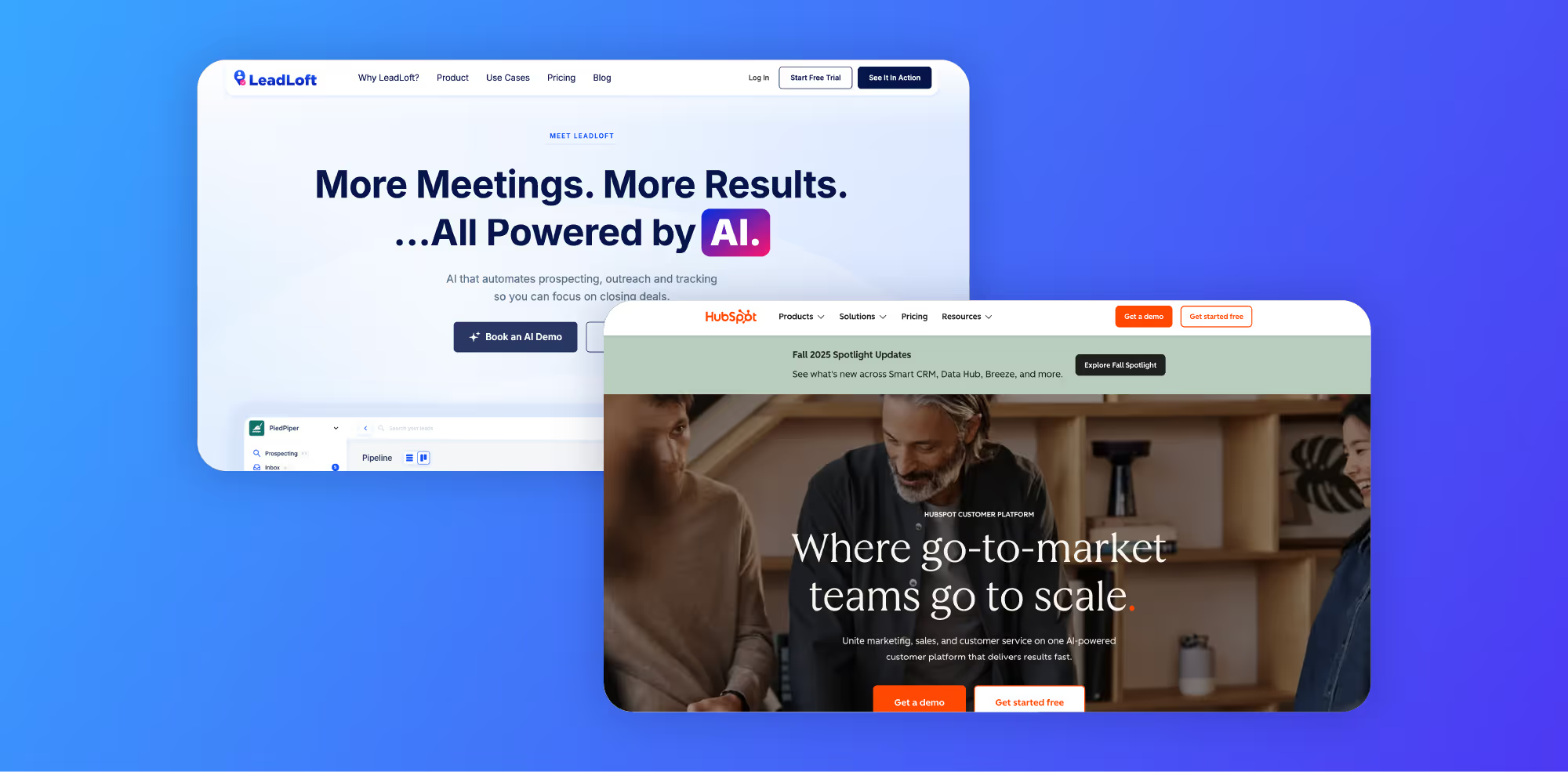When you’re a startup, your priorities are usually:
- Getting your first customers quickly
- Founder or small-team sales (often doing outreach yourself)
- Low friction to set up & use
- Tools that can grow with you without having to rip everything out when you scale
Here are some of the best CRMs that hit those marks. I’ll point out what makes each one good (especially if it helps with LinkedIn or prospecting), what trade-offs you get, and when they make the most sense.
LeadLoft
Why it’s strong for startups:
LeadLoft is built for prospecting, outreach, and communication sync. For a startup, that means you can generate your first leads without having to stitch together a bunch of tools. Founder-led outreach becomes much more manageable: you can do LinkedIn tasks, send connection requests/messages, pull in contact & company data, follow up with email & phone, and see messages from LinkedIn & email in one inbox. No huge integrations needed to start.
Main Pricing:
- The “Unlimited” plan is US$99/month per user.
- There’s also a more advanced Scale AI plan (~US$400/month) when you want extra AI features.
Pros:
- Very easy to get set up, minimal external dependencies
- Strong LinkedIn-prospecting & outreach built in
- Unified inbox + communication sync reduces overhead
- Good value if you are going to use prospecting + outreach + follow-ups actively
Cons:
- Higher cost per user from the start if you only need simple CRM features
- Some advanced analytics or scaling features might lag behind enterprise tools
- As you grow, you may hit limits or want features that cost more
Best Time to Use It:
If you’re bootstrapping, running founder-led sales, trying to get your first 10–50 paying customers, doing outreach via LinkedIn/email/phone, and want something that works out of the box.
HubSpot + OutboundSync
Why it works for startups:
HubSpot is one of the most popular CRMs because it has a generous free tier, lots of templates, integrations, and branding and tools you can grow into. You can start small and then layer in more features. When you integrate something like OutboundSync, you can bring in more robust outbound email, sequences, and sync of data so your outreach tools work more tightly with your CRM.
Main Pricing:
- HubSpot Sales Hub Starter starts at about US$15–20/user/month
- The Professional tier is ~ US$100/user/month
- OutboundSync starts at US$99/month
Pros:
- Very stable and mature platform, good dashboards, reporting, resources & support
- Easier adoption since many people already know HubSpot
- Free / low tier lets you start without heavy cost
- With OutboundSync, your outreach/tools/data sync more reliably with HubSpot
Cons:
- Becomes expensive as you add seats + higher tier features
- Advanced features only available in higher tiers
- Even with OutboundSync, full LinkedIn outreach (messaging, connect automation) is usually less out-of-the-box than LeadLoft
Best Time to Use It:
If you want a CRM that can scale, expect you’ll need more than just outreach eventually, and prefer a stable & broad ecosystem.
Close
Why it’s strong for cold calls + founder-led sales:
Close is built around communication: email, phone calls, SMS. If part of your sales process is making cold calls or follow-up calls, Close makes that easier. The UI is lean, focused, and has less overhead. It’s great when you need your sales tool to help you actually dial and manage conversations, not just store contacts.
Main Pricing:
- “Base” plan starts at US$19/user/month
- “Startup” plan is US$49/user/month billed annually
Pros:
- Strong calling + SMS + email combo
- Easier setup, lightweight compared to big CRMs
- Reasonable cost for what you get
Cons:
- Less marketing or advanced automation features than enterprise CRMs
- If your outreach depends heavily on LinkedIn, you’ll need extra tools
- Some limits in reporting or pipelines in lower tiers
Best Time to Use It:
If your startup relies on cold calling or voice outreach, or you want unified communication to handle calls + emails in one tool.
Pipedrive
Why it works for very low deal volume / visual pipelines:
Pipedrive is simple, visual, and easy to use. If you’re moving a small number of deals (for example founder → first few deals), the drag-and-drop pipeline is very helpful. You see what’s in each stage and what needs follow-ups. Not overloaded with features out of the box.
Main Pricing:
- “Essential” plan is around US$14/user/month
Pros:
- Very low barrier to entry, easy to set up, very visual
- Affordable compared to many competitors
- Good if you’re only tracking a few deals
Cons:
- Not as strong for outreach automation, sequencing, or LinkedIn messaging
- As you scale, you may outgrow it and need to switch
Best Time to Use It:
If you’re just starting, have small deal volume, and want something simple to track pipelines and tasks. Great as a “first CRM” for founder-led sales.
Other CRMs That Make Sense for Startups
- Apollo.io: Great for prospecting, big contact database, and email sequences.
- HubSpot Free CRM: Absolutely minimal cost, good starter option.
- Freshsales (Freshworks CRM): Built-in phone, email, task tracking, affordable tiers.
- Zoho CRM: Flexible and low-cost, works well if you don’t need high polish or deep automation initially.
My Recommendation: What You Should Choose First (As a Startup)
If I were a founder selling my first few clients, here’s what I would pick:
- LeadLoft: Hard to beat for prospecting, outreach, and communication sync immediately. LinkedIn outreach baked in means you can go find leads more actively. Great for founder-led sales.
- Close: Strong choice if cold calling is central to your sales process.
- Pipedrive: Great if you just need a visual pipeline and don’t want complexity.
- HubSpot + OutboundSync: Best grow-into option, start free and layer in more features when needed.


